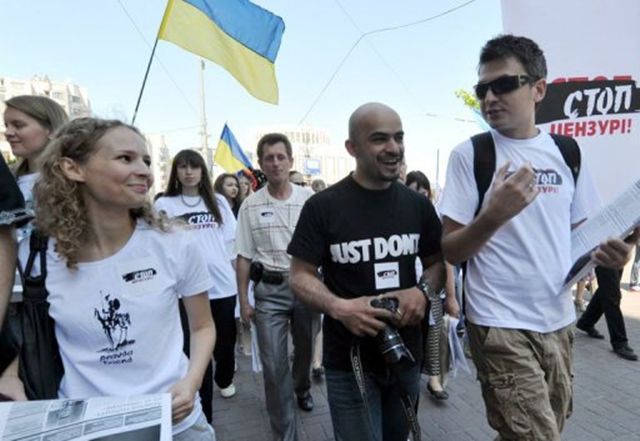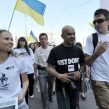
Ukrainian Government Denies Accusations of Bias Against Opposition Journalists
Publication: Eurasia Daily Monitor Volume: 7 Issue: 122
By:

Freedom of speech may be in danger under Ukrainian President, Viktor Yanukovych. The pro opposition media are complaining of harassment despite the Yanukovych team’s assertions that everything is normal. Two opposition-leaning television channels, Channel 5 and TVi, have claimed that the Chairman of the Security Service (SBU) Valery Khoroshkovsky, was behind a court ruling that deprived them of their frequencies. Although Khoroshkovsky denied the accusations, it is difficult for him to convince journalists of his impartiality. He not only chairs the SBU, but also sits on the Supreme Council of Justice (VSU) a body on whose decisions judges depend, and he owns Ukraine’s most popular TV channel, Inter, which is in direct competition with Channel 5 and TVi.
When a court in early June decided to revoke a ruling from last winter by which frequencies in and around Kyiv had been granted to Channel 5 and TVi, the two channels immediately accused Khoroshkovsky of involvement, since the ruling favored Inter (www.liga.net, June 8). Channel 5 was the main pro-democracy news outlet during the Orange Revolution in 2004. Channel 5 journalists went on hunger strike to protest against violations of the freedom of speech by the then President, Leonid Kuchma’s, team which backed the then prime minister, Viktor Yanukovych, in the presidential election.
Yanukovych lost the controversial election in 2004, however, following his victory this year, Channel 5 and other pro-opposition media feared he would take revenge in some form. Nonetheless, the situation is more complicated. Channel 5 and TVi are not only political but also business rivals of Khoroshkovsky and his Inter in the area of news programs and political talk shows. The decision on the two channels’ frequencies was taken by a judge who, in theory, can be ousted by the VSU, on which Khoroshkovsky sits, or investigated for corruption by the SBU chaired by Khoroshkovsky. This represents a clear conflict of interest.
Khoroshkovsky has had a difficult time fending off suspicions of bias against opposition journalists. He even suggested that he was ready to sell Inter, but there were no buyers. Khoroshkovsky also praised freedom of speech as “the main foundation of development.” “If there is no freedom of speech, there will be no development,” he told the opposition-minded journalists who questioned him on his relation to Inter and links to the energy tycoon, Dmytro Firtash, who has an option to buy Inter (Ukrainska Pravda, June 15).
Journalists sympathetic to the opposition have launched the “Stop Censorship” campaign to protest against suspected self-censorship by news editors of several TV channels. The journalists have been complaining that some of their reports, not only those openly critical of the government but also featuring such innocent mistakes as a wreath falling on Yanukovych when he met with Russian President, Dmitry Medvedev, in Kyiv last spring, were not released. Editors explain this in relation to airtime constraints and quality considerations, but the journalists suspect government censorship.
On June 15, Khoroshkovsky agreed to meet with journalists from “Stop Censorship” who told him that certain TV managers received coverage recommendations from government representatives and foreign spin doctors, in particular the Russian citizen Igor Shuvalov. They also recalled that TVi CEO, Mykola Knyazhytsky, complained to the Prosecutor-General’s Office that he was followed by the special services. Khoroshkovsky denied government interference and spying on Knyazhytsky, but conceded that Shuvalov did consult Inter. He also said he did not manage Inter and would resign from public service if the contrary were proved. The journalists were disappointed with the meeting (Kommersant-Ukraine, June 16).
TVi appealed in court against Yanukovych’s decree by which Khoroshkovsky was appointed to VSU. TVi argued that the decree should be revoked on formal grounds as Khoroshkovsky worked in the legal field for fewer years than a respective law prescribes for a VSU member (TVi, June 17). TVi will probably lose the case because of Khoroshkovsky’s political weight. TV journalists sympathetic to the opposition are also set to lose a battle in parliament where opposition caucuses initiated the creation of an ad-hoc committee to examine the complaints of censorship and the issue of broadcasting frequencies. Parliament, which is dominated by pro-Yanukovych forces, used formal grounds to postpone the creation of the committee indefinitely (Ukrainska Pravda, June 17).
Yanukovych has ostensibly instructed law-enforcers to look into the problem of freedom of speech and human rights in general. His press service said on June 18 that Yanukovych ordered Prosecutor-General, Oleksandr Medvedko, to “analyze” the problem and “discuss it at a coordination council to be attended by the president.” Interestingly, speaking earlier in a newspaper interview, Yanukovych denied the existence of the issue, saying that he was “surprised” by complaints from opposition journalists. “We were in opposition, so we place great value on the freedom of speech,” he said (2000 weekly, June 4). Meanwhile, Interior Minister, Anatoly Mogilev, addressing parliament, dismissed complaints from journalists of police intimidation, in particular Knyazhytsky’s claim that he was spied upon. US Ambassador John Tefft called on Kyiv to pay more attention to complaints from journalists. He praised Yanukovych’s pledges to respect the freedom of speech, but said Washington hoped the government would react appropriately to reports of violations of press freedoms. Tefft also said that certain TV companies practiced self-censorship (UNIAN, June 24).




